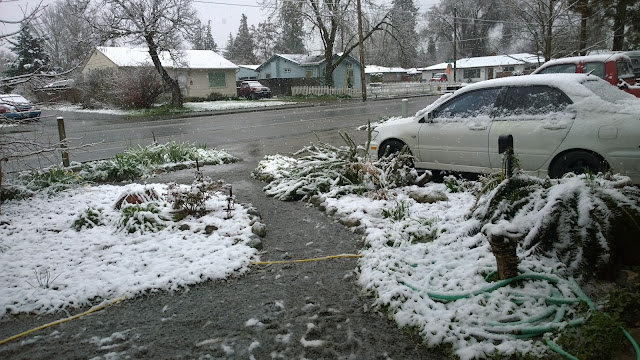March
has come like a white wolf in sheep’s clothing, with snow in the middle of a
week of rainy weather on the 5th and 6th. Can’t garden until it melts, but unlike the
storm in January, it is gone on the 7th. February didn’t have its usual two-week break
of warm, sunny weather; there was some sun between the rains, but not a lot of
warmth. Daffodils barely started to
open, when they are usually in full bloom by mid-month.
We
are told, in this area, that we should cut back the roses when the forsythia blooms,
but as often happens, roses have broken buds and are leafing out well before
the forsythia even breaks a bud. This
gardener crowned most of her roses before the end of February, though there
remain two customers who haven’t been served yet. Not to fret; growth is slow and little will
be lost in waiting another week or two.
We cut roses back to the crown, the
hard knot of wood at the base, rather than the usual foot tall, because black
spot grows all over the stems, and will just re-infect the leaves if any stem
is left on the crown. Nearly every rose
in town has black spot due to our mild winters, though Rosa rugosa is pretty resistant.
This is not the only time one can crown a rose. A rose crowned during the spring growing
season will come back to nearly full height and bloom within a couple of
months. Crowned in summer, it will grow
back and bloom even faster in the heat.
March has the equinox, the day and
night of equal length, on the 20th.
One can plant cannabis clones or seed outside after this date, and they
will not bloom prematurely as long as one does not deprive them of the
increasing day length before 6 weeks after planting. The
way to do that is with a “light depo” or light deprivation house, in which one
pulls a cover over the plants to give them only 12 hours of light, which starts
them blooming heavily and makes their buds more solid. These are being advertised on the radio and
elsewhere.
This year, it may pay to wait a
little longer to plant, for sunny weather to warm the soil up, as your clones
or seedlings will be eaten by bugs if they are planted in soil too cold to get
them growing. The same goes later for regular
summer food crops; if bugs eat your plants, replant.
But now is a good time to plant peas,
potatoes, onions, lettuce, spinach and other greens, preferably from seed or
bulb. Pansies and petunia plants are in
the stores and will be happy in the chilly ground. Cyclamen and hellebores are blooming and will
be available at the Growers Market this month.
Blueberries at Sandy's Nursery. Southern "Legacy" are on the right, with leaves.
It is time to plant blueberries,
which are available now at Sandy’s Nursery in #2 pots. They have included one variety of Southern, Legacy, with their usual Northern varieties. Southern blueberries
take our hot Southern Oregon summers a bit better than Northern varieties; they
keep most of their leaves through the winter and will drop them after they
bloom and new leaves grow. Their branches are thinner and their leaves smaller, and they often turn colors through the winter.
Keep in mind that blueberries want to
be planted in very loose, rich soil.
If yours is not loose enough to dig with your gloved hands, put the
plant on top of the ground and surround it with compost to the top of the roots
and at least 3 feet wide. Unlike most
other potted shrubs, blueberries will sink into the soil as the compost around
it is worked in by worms, rather than being left high and dry.
Their spongy root system does not grow deeper
than about 6 inches for about 5 years, when they put down a deep taproot for
water. To grow big blueberries before
that, run a mister near your plants through the heat of the summer to keep them
happy, and always keep their roots covered with coarse bark, straw, or hard
leaves that will stick around, like oak leaves or pine needles. They want full sun and their feet well
covered and cool.
Rycke Brown, Natural Gardener 541-955-9040 rycke@gardener.com

